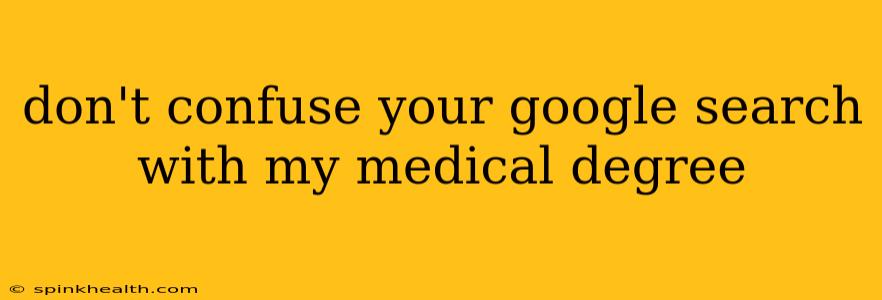Don't Confuse Your Google Search with My Medical Degree: Why Dr. Google Isn't a Replacement for a Doctor
The internet has become an undeniable force in our lives, offering instant access to information on virtually any topic imaginable. This includes, unfortunately, medical information. We've all been there – a nagging cough, a persistent headache, a weird rash – and the first thing we do is reach for our smartphones and Google our symptoms. But this seemingly innocuous act can have unintended and potentially serious consequences. This article explores why you shouldn't confuse your Google search with a medical degree.
It started innocently enough. A mild ache in my back, dismissed as just a pulled muscle from gardening. But the nagging pain persisted, and the internet, ever-present and alluring, offered a plethora of possibilities. From simple muscle strains to sinister spinal tumors, the possibilities were endless and, frankly, terrifying. Hours were spent scrolling through forums, reading medical jargon I barely understood, and ultimately, feeling more anxious than before. This, my friends, is the trap of "Dr. Google."
What are the dangers of self-diagnosing with online medical information?
The internet, while a treasure trove of information, is also a breeding ground for misinformation. Anyone can post anything online, regardless of their qualifications or expertise. This means that well-intentioned but inaccurate information can easily be mistaken for credible medical advice. The risk of misinterpreting symptoms, self-treating with ineffective or even harmful remedies, and delaying professional medical care are all very real dangers.
How reliable is the information I find on medical websites?
The reliability of online medical information varies wildly. Reputable sources like the Mayo Clinic or the National Institutes of Health (NIH) provide accurate and up-to-date information, but these are often buried beneath a sea of less credible sources. Many websites lack proper medical review and may present biased or outdated information. The sheer volume of conflicting information can be overwhelming and confusing, leaving individuals unsure of what to believe.
Can online medical information replace a doctor's visit?
Absolutely not. Online information can be a helpful supplement to professional medical advice, but it should never replace a consultation with a qualified healthcare professional. A doctor can perform a proper physical examination, order necessary tests, and provide a diagnosis based on their expertise and your unique medical history. Self-treating based on online information can lead to missed diagnoses, delayed treatment, and potentially serious health complications.
What are the signs that I need to seek professional medical attention instead of relying on online information?
This is crucial. If your symptoms are severe, persistent, or worsening, you should seek professional medical attention immediately. Don't rely on online information to determine the severity of your condition. Some symptoms, like chest pain, shortness of breath, or severe headache, require immediate medical evaluation.
What are the ethical considerations of providing medical information online?
Providing medical information online carries a significant ethical responsibility. Accuracy, clarity, and avoidance of misinformation are paramount. Websites offering medical advice should be transparent about their sources, qualifications, and any potential conflicts of interest. Misleading or inaccurate information can have serious consequences for individuals relying on it for their health.
In short, while the internet can be a valuable resource for learning more about your health, it’s crucial to remember that it’s not a substitute for professional medical care. Your doctor possesses the expertise, training, and access to diagnostic tools necessary to accurately assess your health and provide appropriate treatment. Don't let Dr. Google’s well-meaning but often misguided advice put your health at risk. Your health is too valuable to gamble with. Schedule that appointment, and leave the diagnosing to the professionals.

